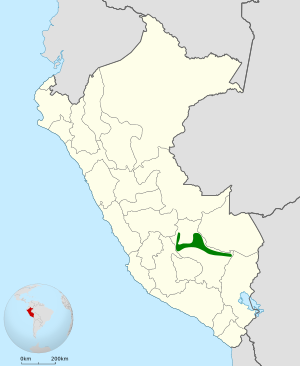Red-and-white antpitta facts for kids
The Red-and-white Antpitta (Grallaria erythroleuca) is a special kind of bird that lives only in Peru. It's part of a bird family called Grallariidae, known for birds that often stay hidden on the forest floor.
This antpitta makes its home in places like moist montane forests, which are forests found on mountainsides. It can also live in areas where forests have been changed or damaged by human activity.
Quick facts for kids Red-and-white antpitta |
|
|---|---|
| Conservation status | |
| Scientific classification |
|
| Kingdom: | Animalia |
| Phylum: | Chordata |
| Class: | Aves |
| Order: | Passeriformes |
| Family: | Grallariidae |
| Genus: | Grallaria |
| Species: |
G. erythroleuca
|
| Binomial name | |
| Grallaria erythroleuca Sclater, PL, 1874
|
|
 |
|
| Script error: The function "autoWithCaption" does not exist. | |
Script error: No such module "Check for conflicting parameters".
Contents
What is an Antpitta?
Antpittas are small to medium-sized birds that mostly live in Central and South America. They are often shy and hard to spot because they spend most of their time on the ground in thick forests. They get their name because some species follow army ants to catch insects that are trying to escape the ants.
Where Does It Live?
The Red-and-white Antpitta is an endemic species, which means it is found naturally in only one specific place in the world. For this bird, that place is Peru. It prefers certain types of habitats, especially moist forests high up in the mountains.
Forest Homes
These birds need healthy forests to survive. They live in areas with lots of trees and plants that provide food and shelter. Even though they can sometimes be found in forests that have been changed, they thrive best in natural, untouched areas.
Appearance and Behavior
The Red-and-white Antpitta gets its name from its beautiful feathers. It has a mix of red, white, and other colors that help it blend into its forest home. Like other antpittas, it often walks or hops on the ground, looking for food.
What Do They Eat?
Antpittas mainly eat insects and other small creatures they find in the leaf litter on the forest floor. They use their strong legs and beaks to search for food among the leaves and soil.
Conservation
The Red-and-white Antpitta is currently listed as "Least Concern" by conservation groups. This means it's not in immediate danger of disappearing. However, protecting its forest habitat is still very important to make sure it continues to thrive for many years to come.
Images for kids
See also
 In Spanish: Tororoí de Cuzco para niños
In Spanish: Tororoí de Cuzco para niños
 | Georgia Louise Harris Brown |
 | Julian Abele |
 | Norma Merrick Sklarek |
 | William Sidney Pittman |



